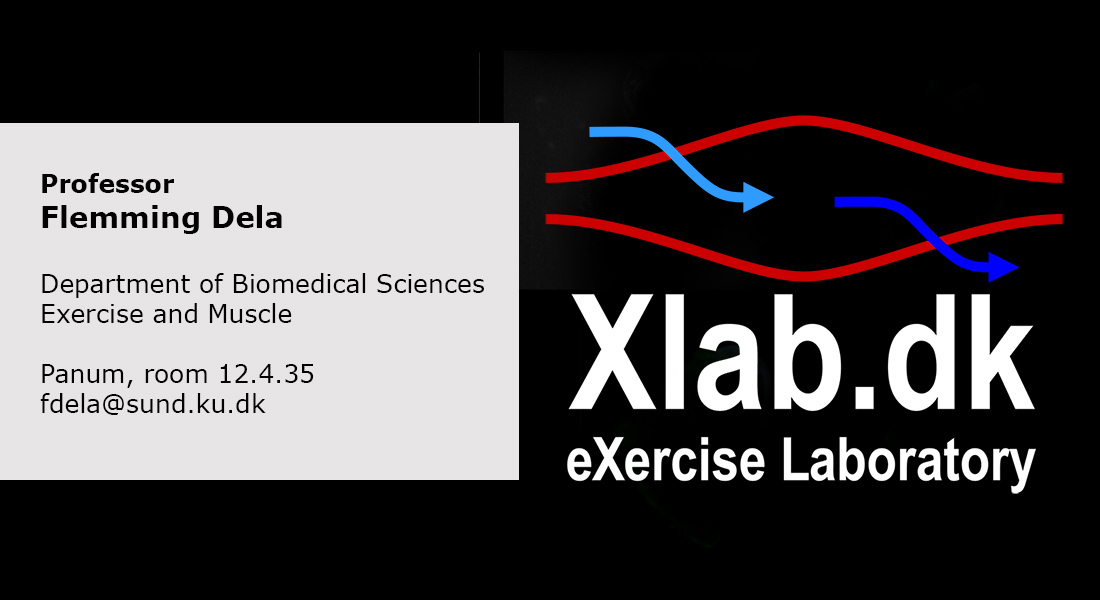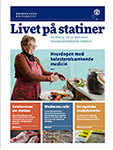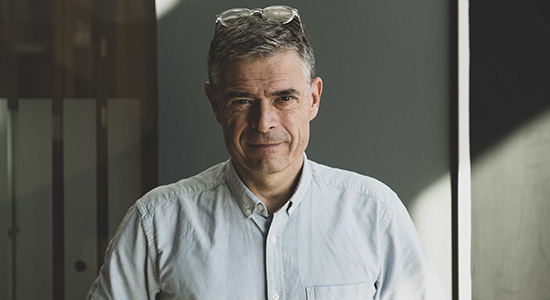Xlab - Physical Activity and Health
We focus on human integrative physiology, with special interest in energy expenditure, metabolism, and cardio-metabolic diseases.

- Diabetes – insulin resistance and insulin secretion.
- The significance of physical training in the treatment of Type 2 diabetes.
- How do physical training/muscle contractions affect insulin sensitivity in muscles?
- How is the insulin production by the β-cells regulated in response to altered physical training?
- Muscle mass and function.
- Strength training for individuals aged 55 and over. Can we preserve and enhance muscle mass? What role do dietary supplements, e.g. Polyphenols, play in low-grade inflammation? Can it be combined with physical training to achieve a synergistic effect? What role does mitochondrial respiratory capacity play, and do training and/or polyphenols reduce the formation of ROS?
- Breast cancer and metabolism.
- The treatment options for breast cancer are fortunately good, but many patients later develop insulin resistance and dysmetabolic conditions. Why? Is it radiation, or chemotherapy? Does it matter if the tumour is estrogen-positive or negative? Are there epigenetic changes occurring during the course?
Human phenotyping:
- Body composition (Dual-Energy X-ray Absorptiometry (DXA scan) + Bioimpedance, including total body water) and specific muscle mass (ultrasound).
- Basal metabolic rate (BMR)
- Maximal Fat Oxidation rate (MFO)
- Blood volume measurement (Detalo Health)
Human performance:
- Maximal oxygen uptake
- Muscle strength and power (handgrip, sit-to-stand test, maximal voluntary contraction (MVC), isokinetic strength, Rate of Force Development (RFD).
Clinical procedures and metabolism:
- Insulin sensitivity (hyperinsulinemic, eu-/iso-glycemic clamps, intravenous and oral glucose tolerance test (OGTT and IVGTT)
- Insulin secretory capacity (hyperglycemic clamp, IVGTT)
- Arterio-venous balance technique (leg or arm) combined with blood flow (ultrasound Doppler)
- Muscle and adipose tissue biopsies
- Blood sampling
Biochemical analyses (blood, muscle, adipose tissue):
- Hormones, substrates, and metabolites (COBAS)
- Glycemic control (HbA1c)
- Mitochondrial respiratory capacity and ROS production (Oroboros 2k)
- Blood gasses (ABL)
- qPCR
- Western blotting
Vi beskæftiger os med fysisk aktivitet og inaktivitet indflydelse betydning for organismens funktioner. Nedenfor ses en liste af emner/stikord som du måske kan genkende dig selv i?
- Kardiovaskulær, metabolisk og morfologisk adaptation til fysisk træning og inaktivitet
- Fysisk træning i forebyggelsen og behandlingen af Type 2 diabetes
- Insulin sekretion og insulin resistens
- Mitokondrie fysiologi – hvordan omsættes næringsstofferne til energi?
- FatMax – evnen til af forbruge fedt som brændstof under fysisk aktivitet
- Fysisk træning af ældre mennesker mhp. at forebygge tab af muskelmasse- og styrke
- Sarcopeni – betydning, forebyggelse og behandling
- Livsstilsintervention - fastholdelse af gode livsstilsvaner
- + Mange andre muligheder, gerne tilpasset dine interesser inden for fysisk aktivitet og sundhed.
Er du interesseret, så skriv til:
Professor Flemming Dela,fdela@sund.ku.dk
Specifikke projekter:
Metabolic and mitochondrial effects of Breast Cancer Treatment
Kontakt adjunkt Linn Gillberg linn.gillberg@sund.ku.dk
 LIFESTAT begyndte i juli 2013 og kørte frem til 2017. LIFESTAT blev generøst støttet af Københavns Universitets 2016-pulje. Yderligere finansiering var nødvendig for at der kunne etablere et "Center of Excellence" på dette meget aktuelle og yderst samfundsrelevante område.
LIFESTAT begyndte i juli 2013 og kørte frem til 2017. LIFESTAT blev generøst støttet af Københavns Universitets 2016-pulje. Yderligere finansiering var nødvendig for at der kunne etablere et "Center of Excellence" på dette meget aktuelle og yderst samfundsrelevante område.
600.000 danskere er i behandling med statiner, som modvirker forhøjet kolesterol i blodet og dermed er med til at mindske risikoen for hjertekarsygdomme.
Ca. 40 % af disse er i 'primær forebyggelse'. De har en øget "risiko profil" for at få hjertekarsygdom (f.eks. forhøjet kolesterol kombineret med alder, rygning, forhøjet blodtryk eller familiær disposition), men de mærker sjældent risikoen for sygdom eller behandlingens virkning.
Nogle patienter i 'primær forebyggelse' mærker til gengæld statinernes bivirkninger, bl.a. muskelsmerter og træthed, som kan være en hindring for en fysisk aktiv livsstil. Der kan også ses en negativ påvirkning af stofskiftet og udvikling af risiko for type 2 diabetes.
Formået med LIFESTAT der blev afsluttet i 2017 var at belyse dette problemkompleks gennem integrerede medicinske, humanistiske og samfundsvidenskabelige undersøgelser og analyser.
Livet på statiner
Da LIFESTAT blev afsluttet i 2017 blev der lavet en avis med titlen"Livet på statiner".
Avisen har til formål at give et let og overskueligt indblik i nogle af de resultater, som LIFESTAT-forskere har fundet frem til under projektets forløb.
LIFESTAT undersøgte
- Muligheden for at udvikle en biomarkør for statininduceret muskelsmerte
- Statiners påvirkning af musklernes energistofskifte på molekylært plan.
- Om Q10 kosttilskud kan afhjælpe de muskulære problemer
- Patientens selvopfattelse i forhold til risiko for sygdom
- Samspillet mellem læge, patient og medier med fokus på risikoopfattelse og forbrug af sundhedsydelser
Medicin, menneske og medier
LIFESTAT var et tværfagligt forskningsprojekt, som undersøgte virkningen af statiner på sundhed, livsstil, trivsel og selvopfattelse på en kohorte af i udgangspunkt 200 statin-brugere matchet op mod 200 kontrolpersoner.
Herudover blev yderligere 400 personer inddraget i en undersøgelse, som tog udgangspunkt i persondata og en spørgeskemaundersøgelse. Denne havde til formål at afdække personernes kilder til viden om sundhedsspørgsmål generelt og specifikt i forhold til brug af statiner. Endvidere skulle den afdække holdninger og beslutningsprocesser i forhold til brug af statiner, forandringer i livsstil og anvendelse af diverse måleteknikker.
Mål #1 – Selv-monitorering – interaktionen mellem mennesker og teknologi
LIFESTAT skal undersøge personlige og sociale følger af patienters forbedrede muligheder for at overvåge blodets indhold af kolesterol. Hvilken indflydelse har dette på beslutningen om at tage eller ikke tage medicin? Hvorfor vælger nogen at overvåge dette, mens andre ikke gør – og hvordan hænger det sammen med deres kost- og motionsvaner?
Mål #2 – Information, formidling, medier – forbrug og effekt
LIFESTAT vil undersøge, hvordan forskellige former for medieomtale af statiner påvirker den enkeltes oplevelse af sig selv som patient. En omfattende analyse af avisartikler m.v. vil blive sammenholdt med resultater fra spørgeskemaundersøgelser og interviews.
Mål #3 – Statiner, muskelpatologi og motion
LIFESTAT vil kortlægge de molekylære mekanismer bag statiners negative påvirkning af musklerne, og undersøge om kostens indhold af Q10 spiller en rolle. Muskelsmerter er velkendte, men området er ikke tidligere blevet grundigt biomedicinsk dokumenteret.
Mål #4 – Motiver og barrierer i valg af behandling
LIFESTAT skal undersøge patienters motiver og barrierer i forhold til valg af statin behandling i almen praksis, herunder patient compliance, dvs. patienternes adfærd i forhold til den foreskrevne behandling. Vores viden om dette er begrænset, og vi vil undersøge om anvendelse af statiner hænger sammen med oplevelse af symptomer, livsbegivenheder, tilstedeværelsen af andre sygdomme og viden om bivirkninger. For at nå dette mål vil vi benytte data fra spørgeskemaer kombineret med nationale sundhedsregistre og datafangst i almen praksis.
Projektdeltagere
SUND, Biomedicinsk Institut
- Flemming Dela, MD, DMSci, Professor
- Jørn Wulff Helge, MSc, PhD, Professor
- Steen Larsen, DMSci, Associate Professor
- Anja Birk Kuhlman, MD. PhD student indtil 01.08.2018
- Thomas Morville, MD, PhD student indtil 01.08.2018
- Tine Dohlmann, M.Sc., PhD student indtil 01.08.2017
SUND, Institut for Cellulær og Molekylær Medicin
- Lene Rasmussen, PhD, professor
- Ian Hickson, PhD, professor
- Jon Ambæk Durhuus, PhD student
SUND, Institut for Folkesundhedsvidenskab
- Allan Krasnik, MD, professor
- Margit Kriegbaum, postdoc
- John Sahl Andersen, PhD, associate professor
- Andreas Heltberg
SAMF, Institut for Antropologi
- Bjarke Oxlund, PhD, Associate professor indtil 01.10.2017
- Sofie Rosenlund Lau, M.Sc., PhD student
- Birgitte Bruun, PhD, Postdoc indtil 01.09.2017
HUM, Institut for Medier, Erkendelse og Formidling
- Christa Lykke Christensen, PhD, associate professor
- Kasper Bering Liisberg, PhD student indtil 01.02.2017
- Maja Klausen, PhD, Postdoc
Publikationer
- Christensen, C.L., Wulff, H.J., Krasnik, A., Kriegbaum, M., Rasmussen, L.J., Hickson, I.D., Liisberg, K.B., Oxlund, B., Bruun, B., Lau, S.R., Olsen, M.N., Andersen, J.S., Heltberg, A.S., Kuhlman, A.B., Morville, T.H., Dohlmann, T.L., Larsen, S., Dela, F. (2016). LIFESTAT - Living with statins: An interdisciplinary project on the use of statins as a cholesterol-lowering treatment and for cardiovascular risk reduction. Scand J Public Health 44, 534-539.
- Nixon, M., Vendelø, M.T. General practitioners’ decisions about discontinuation of medication: An explorative study. Journal of Health Organization and Management. 2016 Jun 20;30(4):565-80.
- Kriegbaum, M., Wallach Kildemoes, H., Rasmussen, J.N., Hendriksen, C., Vass, M., Mortensen, E.L., Osler, M. Childhood socioeconomic position, young adult intelligence and fillings of prescribed medicine for prevention of cardiovascular disease in middle-aged men.BMJ Open. 2014 Jan 17; 4(1).
- Christensen, C.L. Mediatization of health expertise. Health programmes on Danish public service television. In Critical Studies in Television. The international journal of television studies, 11 (2):204-16. 2016.
- Nixon, M., Kousgaard, M.B. Organising medication discontinuation: a qualitative study exploring the views of general practitioners toward discontinuing statins. BMC Health Services Research 16:226 (2016).
- Lau, S.L. and Traulsen, J.M. Are we ready to take up the challenge? Addressing the shortcomings of contemporary qualitative health research. Article of the year 2017 of Research in Social and Administrative Pharmacy, volume 13, Issue 2, March-April, pages 332-338, 2017.
- Heltberg, A.S., Andersen, J. S., Kragstrup, J., Siersma, V.D., Sandholdt, H., Ellervik, C. (2017). Social disparities in diabetes care: a general population study in Denmark. Scandinavian Journal of Primary Health Care. Scand J Prim Health Care 35, 54-63.
- Kriegbaum, M., Liisberg, K., Wallach-Kildemoes, H.: Pattern of statin use changes following media coverage of its side effects. Patient Preference and Adherence 2017:11 1151-1157.
- Asping, M., Stride, N., Søgaard, D., Dohlmann, T.L., Helge, J.W., Dela, F., Larsen, S. The effects of two weeks of statin treatment on mitochondrial respiratory capacity in middle aged males. The LIFESTAT study. European Journal of Clinical Pharmacology. 2017 Jun;73(6):679-687.
- Heltberg, A., Andersen, J.S., Sandholdt, H., Siersma, V., Kragstrup, J., Ellervik, C. Predictors of undiagnosed prevalent type 2 diabetes - The Danish General Suburban Population Study. Primary Care Diabetes Feb;12(1):13-22, 2017.
- Lau, S.R., Andersen, J.S., Dela, F., Oxlund, B. The Rise of Statins in Denmark: Making the Case for a Localized Approach to the Routinization of Pharmaceutical Prevention of Cardiovascular Disease. BioSocieties, pp1-23, 2018.
- Kriegbaum, M., Lau, S.R. Medication non-adherence and uncertainty: Information-seeking and processing in the Danish LIFESTAT survey. Research in Social and Administrative Pharmacy Aug 14(8):736-741, 2018.
- Lau, S.R, Kriegbaum, M. Medication Non-Adherence in the Context of Situated Uncertainty. Moving Beyond Simple, Dichotomous Approaches. Research in Social and Administrative Pharmacy Aug;14(8):742-748, 2018.
- Sahl, R.E., Andersen, P.R., Gronbaek, K., Morville, T.H., Rosenkilde, M., Rasmusen, H.K., Poulsen, S.S., Prats, C., Dela, F., & Helge, J.W. Repeated Excessive Exercise Attenuates the Anti-Inflammatory Effects of Exercise in Older Men. Front Physiol 8, 407, 2017.
- Bruun, B. and Hillersdal, L. Foruroligende øjeblikke og vage forbindelser: Etisk arbejde i tværvidenskabelig forskningspraksis. Tidsskriftet Antropologi. 2018(77): 45-64.
- Heltberg, A., Siersma, V., Andersen, J.S., Ellervik, C., Brønnum-Hansen, H., Kragstrup, J., de Fine Olivarius, N. Socio-demographic determinants and effect of structured personal diabetes care: a 19-year follow-up of the randomized controlled study diabetes Care in General Practice (DCGP). BMC Endocrine. Dec 8;17(1):75, 2017.
- Hillersdal, L., Jespersen, A.P., Oxlund, B., Bruun, B. Affects and effects of interdisciplinary research collaboration on obesity and cholesterol lowering medicine in Denmark. Science and Technology Studies. Published online.
- Hansen M, Kuhlman ACB, Sahl RE, Kelly B, Morville T, Dohlmann TL, Chrois KM, Larsen S, Helge JW, & Dela F. Inflammatory biomarkers in patients in Simvastatin treatment: No effect of co-enzyme Q10 supplementation. Cytokine, in press, 2018.
- Dohlmann TL, Morville T, Kuhlman AB, Chrois KM, Helge JW, Dela F, & Larsen S. Statin treatment decreases mitochondrial respiration but muscle coenzyme Q10 levels are unaltered: The LIFESTAT study. J Clin Endocrinol Metab, in press, 2018.
- Larsen S, Vigelso A, Dandanell S, Prats C, Dela F, & Helge JW (2018). Simvastatin-Induced Insulin Resistance May Be Linked to Decreased Lipid Uptake and Lipid Synthesis in Human Skeletal Muscle: the LIFESTAT Study. J Diabetes Res 9257874, 2018.
- Kuhlman AB, Morville T, Dohlmann TL, Hansen M, Kelly B, Helge JW, & Dela F. Coenzyme Q10 does not improve peripheral insulin sensitivity in statin-treated men and women; the LIFESTAT study. Appl Physiol Nutr Metab, in press, 2018.
- Morville, Th., Dohlmann, T., Kuhlman, A.B., Monberg, T., Torp, M., Hartmann, B., Holst, J.J., Larsen, S., Helge, J.W., Dela, F. Glucose homeostasis in statin users - the LIFESTAT study. Diabetes Metab Res Rev, in press, 2018.
Ph.d.-forsvar
Anja Birk Kuhlmann
"The Influence og statin use, CoQ10 supplementation and exercise on glucose homeostasis”
Afholdt den 13. december 2018
Thomas Hoffmann Morville
"Glucose homeostasis and physical performance in Danish statin users in primary prevention"
Afholdt den 9. november 2018
Kasper Bering-Liisberg
"Løgn og Statin"
Afholdt den 26. oktober 2018
Andreas Søndergaard Heltberg
"Social disparity in type 2 diabetes - diagnosis, care, prognosis and effect of structured personal care"
Afholdt den 30. august 2018
Sofie Rosenlund Lau
"A Matter of Course. An Ethnographic Assemblage of the Routinization of Statins in Denmark"
Afholdt den 23. marts 2018
Tine Lovsø Dohlmann
"Role of mitochondria in statin induced myalgia"
Afholdt den 21. december 2017
Michael Nixon
"Organising medication discontinuation"
Afholdt den 6. februar 2015
Group Leader
Flemming Dela
Læge, professor, dr. med.
Phone +452120 9957
fdela@sund.ku.dk
ORCID: 0000-0001-9970-9535

Group members
| Name | Title | Phone | |
|---|---|---|---|
| Arthur Ingersen | Guest Researcher | ||
| Flemming Dela | Professor | +4535327425 | |
| Frida Wolter Mastek | Master Student | +4535325494 | |
| Hanne K. Rasmusen | Guest Researcher | ||
| Linn Gillberg | Assistant Professor |

